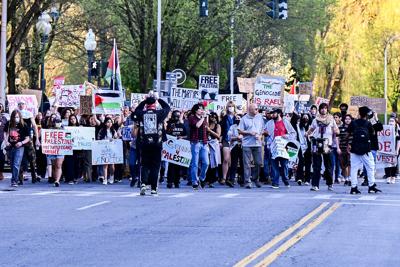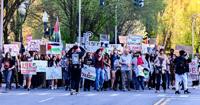On Skidmore College’s campus, the display is known simply as “The Vigil.”
For an April 12 walkout in solidarity with Palestinians, students at the private college in Saratoga Springs compiled artwork and portraits. They collected candles and red poppies, Palestinian flags and paper watermelons – a fruit that has come to stand in for the flag because it shares the flag’s green, red, black and white colors.
The ceasefire posters and drawings of doves were to help mourn the more than 34,000 Palestinian lives lost since Israel launched its counteroffensive following the Oct. 7 attack by Hamas that killed roughly 1,200 people.
But some of the work in the vigil contained six words that have ignited intense passion as pro-Palestinian demonstrations have formed on college campuses across the country: “From the river to the sea.”
While many Palestinian activists claim these words, which refer to the land between the Jordan River and the Mediterranean Sea, are meant as a call for peace and equality, many Jews hear these words as a call for the complete destruction of Israel.
On April 19, the Skidmore display with these words was allowed to be set up on the first floor of the campus library.
It stood there for a few days.
But by April 22, the school’s administrators had ordered the vigil be taken down.
As of this writing, the display remains down.
“Although created with sensitivity to diverse audiences, placing the display in the library was challenging, given the nature of the material,” a school spokesperson wrote in an emailed statement, opting not to make Skidmore President Marc Conner available for an interview. “The library is a space that intentionally minimizes disruptions in order to enhance students’ ability to study, collaborate, and learn. We are now engaged in finding a more suitable location on our campus for the display, so that people can choose whether or not to view it.”
The entire ordeal, in which the administration first allowed a library installation that it still describes as being “created with sensitivity” before ultimately having it removed, represents just how tense things are on college campuses.
This Skidmore display wasn’t a violent protest. It wasn’t a sit-in or a tent encampment on school property. It was an art display and memorial – albeit one that used language that many, including the Anti-Defamation League and a recently passed U.S. House of Representatives resolution, deem to be antisemitic.
It was all enough to make Skidmore administrators uncomfortable at a time when college administrators across the country are wrestling with when conduct and words cross the line of acceptable academic speech.
“It’s possible both to respect the passion of the protestors whose ultimate goal is to drive change and hold their institutions accountable, but still decry disruptive methods that interrupt the educational process, damage property and endanger people,” Siena College President Charles Seifert wrote to me via email in a statement addressing the broader national protest movement.
As college administrators mull how to respond to protestors, it’s clear many are unnerved, possibly afraid of becoming the next Claudine Gay or Elizabeth Magill, who resigned from their Ivy League leadership positions after fallout from U.S. Congressional testimony during which they failed to clearly state that calls for genocide violated school policies.
In a demonstration of just how skittish local administrators seem to be to discuss the current protest climate, Seifert was the only one to engage with me on this issue. And he only agreed to written correspondence after initially scheduling a phone conversation. David Harris, the president of Union College, which is facing a federal probe to do with its handling of an incident this fall in which a student made seemingly antisemitic comments on campus, wouldn’t speak. University at Albany President Havidán Rodríguez and Skidmore President Conner did not respond to interview requests made through their schools’ press offices.
Administrators are likely hoping the upcoming college commencement season can put to bed all the civil unrest. So it makes some amount of sense to bide their time, hoping to run out the clock without inciting anger and escalating protests.
As of this writing, no Capital Region school has seen any violent protest, though on Thursday night SUNY New Paltz administrators called in police to address a student encampment, and more than 130 people were arrested, according to reporting by the Albany Times Union.
But it’s not just administrators who are reluctant to discuss what’s happening. Members of the Skidmore Coalition for Palestine would not speak with me about the library vigil after first agreeing to an interview. And Skidmore’s Jewish Student Life coordinator never returned an interview request.
Meanwhile, during a pro-Palestinian May 1 march from Congress Park to Saratoga Springs City Hall, a young man wearing a Skidmore sweatshirt refused to answer questions, saying he didn’t want to provide any “soundbites.”
That echoed recent reporting by the New York Times about many protestors wearing masks to shield their identities.
It seems we’re living in a climate fearful of retribution and reductive labels, a world in which anti-Zionism gets instantly equated with antisemitism, and support for Israel gets called out as colonialism. We live in fear that one ill-advised viral moment can doom an entire career.
“When you start to condense a complex thing down into simple good and bad and right and wrong, people get grouped in all sorts of ways, and they don't get to choose. So all of a sudden, Palestinians and Hamas are grouped in as all being victims. And all of a sudden, perhaps, Israel and Jews are all being grouped in as the perpetrators of evil,” said Beth Sabo Novik, president of Temple Sinai in Saratoga Springs. "And the problem is it's actually not that simple.”
For instance, Novik and other Jews working in Saratoga Springs said they have complicated feelings about the phrase “from the river to the sea.”
While Novik said she is upset by its history as a call for wiping out Israel, she’s not convinced protesters necessarily intend it that way.
“If you really sat down with each individual chanter and said, ‘what do you believe this means?’ I think you would get probably a wide range of answers,” Novik said.
David Cohen, chair of Skidmore’s Department of Management and Business, told me, as a Jewish person he doesn’t like the phrase, but he’s supportive of free speech.
"I'm strongly in favor of allowing the students to say things, even things I disagree with, even things I find problematic, so long as they're not disrupting the education of others," Cohen told me.
Adam Tinkle, who is Jewish and who said many of his family members have Zionist beliefs, said he sees the phrase as a call for a more peaceful political configuration in the region.
“Especially given the enormous loss of life that the current configuration has brought to both sides since October, I’d argue that when we chant in hopes for freedom to come to all of Israel and Palestine, that’s actually the opposite of antisemitic,” said Tinkle, who is on faculty at Skidmore’s John B. Moore Documentary Studies Collaborative.
But when nuanced views aren’t considered, conversations shut down and you get good versus evil and us vs. them. That’s precisely the climate that provokes knee-jerk reactions, whether it’s unnecessarily calling in the police or calling for artwork to come down.
"Though certain words have been the flashpoint, it doesn’t end with colleges deciding whether it’s OK to say ‘from the river to the sea.’ We’re in the midst of a much wider silencing of debate and discourse, nationwide,” said Tinkle, 38. “When universities and colleges censor dialogue on this issue, they are, of course, putting themselves in a particularly dangerous situation, because they’re failing to live up to their own stated ideals. That said, alums, donors and members of Congress are putting terrible pressure on colleges to try and prevent meaningful dialogue, cynically defining antisemitism as whatever speech they don’t want to hear. Some have stood stronger than others in the face of that pressure.”
Maybe nervous college administrators are right to wait things out. Maybe tempers will calm as talks of a ceasefire result in real, lasting peace in Gaza. But if bombardment in the Middle East heats up over the summer, there’s no telling how hot college campuses could be this fall.
Maceo Foster, 22, who co-chairs the UAlbany Young Democratic Socialists of America, told me the student coalitions he is part of are frustrated with the university administration’s failure to take any action on a resolution passed by the school’s Student Association calling for the school to divest from companies that support the Israel Defense Forces.
"I think that President Rodriguez has largely ignored the demands of the student body," Foster said.
In response, University at Albany spokesperson Jordan Carleo-Evangelist said, “throughout the academic year, members of the UAlbany leadership team have had ongoing dialogue with student groups, including the members of the SA Senate."
Carleo-Evangelist added that UAlbany is a New York state entity and part of a larger state university system, and the school's contractual relationships are public record.
"Practically speaking, the University at Albany does not hold private investments, and the University at Albany Foundation does not directly invest in private companies," he said.
To date, protests on UAlbany’s campus have been largely peaceful, and student protestors don’t currently have plans for an encampment or any escalation, Foster said.
But he suggested student protesters will ultimately take their cues from the administration’s actions.
“I think that it would be sad. And it would be disturbing if the university continues to ignore the collective demands of the student body,” he said.
Foster believes the university’s leadership is simply hoping things cool off come summer break.
"It's very clear that they've decided that their strategy is to wait for the summer when students are no longer on campus and hope this blows over,” Foster told me. “They've made that very clear through their inaction."
Of course, ignoring an issue never makes it go away.
So even if university leaders and student activists are nervous to talk to the press, hopefully, they can engage meaningfully with each other. We’ve already seen promise. For instance Brown University peacefully ended a student encampment by agreeing to discuss divestment.
And Skidmore, too, has seen breakthroughs. Students there said they have encouraged administrators to move away from serving Sabra hummus, made by a company the students allege has ties to the Israel Defense Forces.
"When we talk to staff, however, they're responsive, they listen to us,” Adrian Antonioli, a Skidmore junior who represents the Skidmore Coalition for Palestine, said during the recent rally in Saratoga Springs. “They hear your concern and they react accordingly.”
In other words, reasonable compromise is possible, with open dialogue leading to progress.
Meanwhile, putting an end to student protests stemming from issues as complex as the conflict in Gaza will never be as simple as taking down a few posters.









